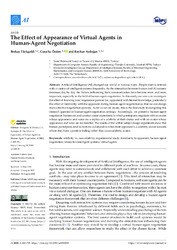The effect of appearance of virtual agents in human-agent negotiation
| dc.contributor.author | Türkgeldi, Berkay | |
| dc.contributor.author | Özden, Cana Su | |
| dc.contributor.author | Aydoğan, Reyhan | |
| dc.date.accessioned | 2023-09-11T10:31:06Z | |
| dc.date.available | 2023-09-11T10:31:06Z | |
| dc.date.issued | 2022-09 | |
| dc.identifier.issn | 2673-2688 | en_US |
| dc.identifier.uri | http://hdl.handle.net/10679/8784 | |
| dc.identifier.uri | https://www.mdpi.com/2673-2688/3/3/39 | |
| dc.description.abstract | Artificial Intelligence (AI) changed our world in various ways. People start to interact with a variety of intelligent systems frequently. As the interaction between human and AI systems increases day by day, the factors influencing their communication have become more and more important, especially in the field of human-agent negotiation. In this study, our aim is to investigate the effect of knowing your negotiation partner (i.e., opponent) with limited knowledge, particularly the effect of familiarity with the opponent during human-agent negotiation so that we can design more effective negotiation systems. As far as we are aware, this is the first study investigating this research question in human-agent negotiation settings. Accordingly, we present a human-agent negotiation framework and conduct a user experiment in which participants negotiate with an avatar whose appearance and voice are a replica of a celebrity of their choice and with an avatar whose appearance and voice are not familiar. The results of the within-subject design experiment show that human participants tend to be more collaborative when their opponent is a celebrity avatar towards whom they have a positive feeling rather than a non-celebrity avatar. | en_US |
| dc.description.sponsorship | Vestel Elektronik Sanayi ve Ticaret A.Ş | |
| dc.language.iso | eng | en_US |
| dc.publisher | MDPI | en_US |
| dc.relation.ispartof | AI (Switzerland) | |
| dc.rights | Attribution 4.0 International | * |
| dc.rights | openAccess | |
| dc.rights.uri | http://creativecommons.org/licenses/by/4.0/ | * |
| dc.title | The effect of appearance of virtual agents in human-agent negotiation | en_US |
| dc.type | Article | en_US |
| dc.description.version | Publisher version | en_US |
| dc.peerreviewed | yes | en_US |
| dc.publicationstatus | Published | en_US |
| dc.contributor.department | Özyeğin University | |
| dc.contributor.authorID | (ORCID 0000-0002-5260-9999 & YÖK ID 145578) Aydoğan, Reyhan | |
| dc.contributor.ozuauthor | Aydoğan, Reyhan | |
| dc.identifier.volume | 3 | en_US |
| dc.identifier.issue | 3 | en_US |
| dc.identifier.startpage | 683 | en_US |
| dc.identifier.endpage | 701 | en_US |
| dc.identifier.wos | WOS:001021508200001 | |
| dc.identifier.doi | 10.3390/ai3030039 | en_US |
| dc.subject.keywords | Celebrity vs. non-celebrity | en_US |
| dc.subject.keywords | Experimental study | en_US |
| dc.subject.keywords | Familiarity to opponent | en_US |
| dc.subject.keywords | Human-agent negotiation | en_US |
| dc.subject.keywords | Interactive intelligent systems | en_US |
| dc.subject.keywords | Virtual agents | en_US |
| dc.identifier.scopus | SCOPUS:2-s2.0-85169556661 | |
| dc.contributor.ozugradstudent | Türkgeldi, Berkay | |
| dc.contributor.ozugradstudent | Özden, Cana Su | |
| dc.relation.publicationcategory | Article - International Refereed Journal - Institutional Academic Staff, Graduate Student and Undergraduate Student |
Files in this item
This item appears in the following Collection(s)
Share this page




